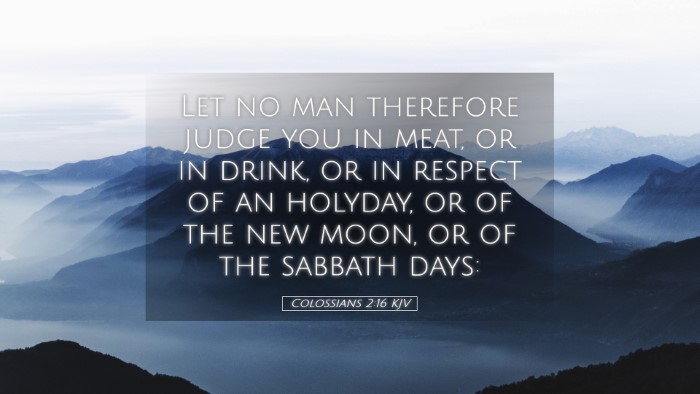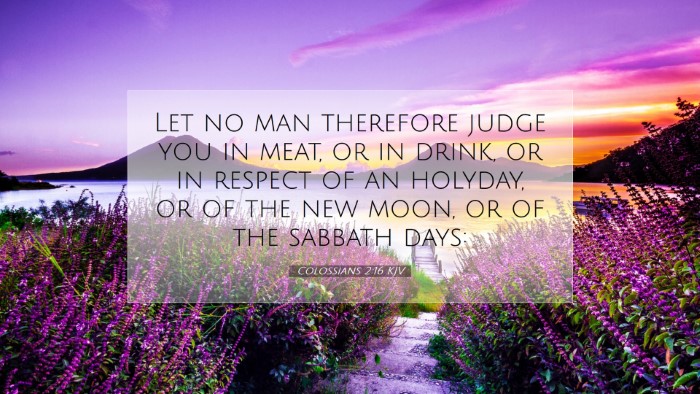Commentary on Colossians 2:16
Verse Reference: Colossians 2:16 - "Let no man therefore judge you in meat, or in drink, or in respect of an holyday, or of the new moon, or of the sabbath days."
Introduction
The Apostle Paul, in his letter to the Colossians, addresses various issues concerning the judgment of others in matters of religious observance. Colossians 2:16 highlights the liberating truth for believers regarding dietary laws and the observance of specific religious days. This commentary synthesizes insights from notable public domain commentaries by Matthew Henry, Albert Barnes, and Adam Clarke, providing a comprehensive understanding of this verse.
Contextual Background
In the broader context of the epistle, Paul confronts false teachings that were infiltrating the church at Colossae. These teachings often involved legalistic practices and the insistence on adherence to certain dietary rules and religious festivals. Paul emphasizes the sufficiency of Christ and the believer's freedom from the bondage of the law.
Verse Analysis
1. "Let no man therefore judge you"
Henry: Paul begins with a directive, warning believers against allowing others to impose judgment upon them regarding their faith and practices. The word "therefore" indicates a conclusion based on prior teaching about Christ's sufficiency (Colossians 2:9-15).
Barnes: The term "judge" suggests a critical or censorious attitude whereby others assess one's piety based on external observances. Barnes emphasizes that such judgment is misplaced because it does not reflect true spirituality or relationship with Christ.
Clarke: Clarke elaborates on the nature of this judgment, noting that it refers to a tendency to evaluate another’s spirituality based on adherence to the Law, ignoring the essence of faith in Christ. Believers are cautioned to stand firm against such evaluations.
2. "in meat, or in drink"
Henry: The reference to "meat" and "drink" covers the Jewish dietary laws which were a source of significant contention. Henry points out that these external practices should not define one’s relationship with God.
Barnes: Barnes emphasizes that the apostle asserts the principle of Christian liberty. He notes that the law concerning food is rendered ineffective by the new covenant in Christ, who declared all foods clean (Mark 7:19).
Clarke: Clarke provides historical insight into the cultural context, explaining that the disputes regarding food and drink were common amongst early Christians, mirroring the conflicts faced by the early church in the book of Acts (Acts 10:15).
3. "or in respect of an holyday, or of the new moon"
Henry: Holy days and the new moon observances were significant within the Jewish calendar. Henry explains that Paul highlights the futility of such observances in the light of the new covenant through Jesus Christ.
Barnes: Barnes adds that such observances are now obsolete for Christians, as the true essence of these days was fulfilled in Christ. He warns against being ensnared by legalistic observances that detract from the true glory of Christ.
Clarke: Clarke mentions that while certain days were ordained by God, the emphasis must now be placed on Christ, who is the fulfillment of the law, thus rendering the observance of old festivals unnecessary.
4. "or of the sabbath days"
Henry: The Sabbath, a day of rest and worship, is another focal point in Paul’s teaching. Henry stresses that while the Sabbath is beneficial, it should not become a legalistic burden but a joyful expression of faith.
Barnes: Barnes notes the significance of the Sabbath principle of rest, yet he affirms that Christians are not bound to the literal observance of the Sabbath but to rest in Christ, who provides spiritual rest (Matthew 11:28-30).
Clarke: Clarke argues that the essence of the Sabbath is fulfilled in Christ and underscores that the observance of the Sabbath should align with the spirit of the law, not merely its letter.
Theological Implications
This verse encapsulates the tension between grace and legalism. Believers are reminded that their standing before God is not contingent upon external practices but anchored in faith in Christ. The implications extend into modern Christian practice, challenging the church to avoid legalistic judgments that obscure the gospel.
1. The Danger of Legalism
Legalism can detract from the essence of faith, leading to a performance-based religion rather than a relationship based on grace. Paul’s warning serves as a timeless reminder for the church to prioritize genuine faith over ritualistic observance.
2. The Sufficiency of Christ
The verse reinforces the sufficiency of Christ. Believers are called to recognize their identity in Christ, which transcends cultural norms and religious practices. This foundational truth empowers them to live in freedom and joy.
Conclusion
Colossians 2:16 challenges believers to embrace the freedom they have in Christ, eschewing judgment from others based on dietary restrictions or religious observances. Insights from public domain commentaries by Henry, Barnes, and Clarke collectively highlight the importance of focusing on Christ rather than man-made traditions. As the church navigates the complexities of faith practice in contemporary society, this verse remains a pivotal teaching on the inherent freedom and fullness found in Jesus Christ.


